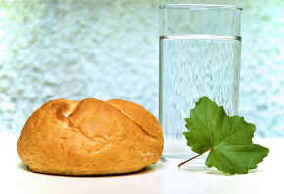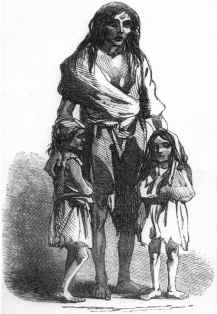
THE
BEATITUDES
LESSON
FOUR
The
hungry.
Memorize Mt
5:6 with proper punctuation.
You will need it for both the section test as well as for the Final Test.
Matthew 5:6
“Blessed are they which do hunger and thirst after righteousness: for they shall be filled.”

Introduction: If we are to be in God's will and develop the godly character that He wants to produce in us, we cannot consider righteousness to be an option. Instead, we must realize that it is a necessity of life as much as is food and water.
This necessity of life, righteousness, needs to be treated as the equivalent of
food and water; or even shelter and air, other necessities of life. In other words, all of the things without which we just
simply cannot survive! Human beings will go to any lengths to seek
and obtain these necessities. Nothing will stop us in our quest for food, for
water, for shelter, and our quest for air can best be seen in the thrashings and
contortions of a drowning man trying to climb above the water to fill his lungs
with the air that he desperately needs to live. In this section we will
concentrate mostly on the necessities given by way of example in this
beatitude, food and water.
Families, tribes, and even nations have gone to war to obtain these and other various necessities of life. The lack of these necessities has caused unimaginable hardship and suffering.
One example is the great potato famine in Ireland when the staple crop, potatoes, was devastated for years in a row by a fungus blight that destroyed this one main food supply. Spreading sometimes as much as 50 miles per day as the spoors were spread by the wind, the people saw their crop year after year blacken, shrivel, and begin to stink as it was consumed by the fungi and then rotted. They had no way at that time to discover what what decimating their food supply so all they could do was watch, and wail, and die.
| The potato famine in
Ireland
(Picture: London News, Dec. 22,
1849) Depiction of the Irish potato famine: The Sketch of a Woman and Children represents Bridget O'Donnel. Her story is briefly this:-- '. . .we were put out last November; we owed some rent. I was at this time lying in fever. . . they commenced knocking down the house, and had half of it knocked down when two neighbours, women, Nell Spellesley and Kate How, carried me out. . . I was carried into a cabin, and lay there for eight days, when I had the creature (the child) born dead. I lay for three weeks after that. The whole of my family got the fever, and one boy thirteen years old died with want and with hunger while we were lying sick. (22)
|
 |
By 1847 the lack of food had already caused many thousands to succumb to diseases. Horrific scenes such as are described below became common.
|
Nicholas Cummins, the magistrate of Cork, visited the hard-hit coastal district of Skibbereen. "I entered some of the hovels," he wrote, "and the scenes which presented themselves were such as no tongue or pen can convey the slightest idea of. In the first, six famished and ghastly skeletons, to all appearances dead, were huddled in a corner on some filthy straw, their sole covering what seemed a ragged horsecloth, their wretched legs hanging about, naked above the knees. I approached with horror, and found by a low moaning they were alive -- they were in fever, four children, a woman and what had once been a man. It is impossible to go through the detail. Suffice it to say, that in a few minutes I was surrounded by at least 200 such phantoms, such frightful spectres as no words can describe, [suffering] either from famine or from fever. Their demoniac yells are still ringing in my ears, and their horrible images are fixed upon my brain." The dead were buried without coffins just a few inches below the soil, to be gnawed at by rats and dogs. In some cabins, the dead remained for days or weeks among the living who were too weak to move the bodies outside. In other places, unmarked hillside graves came into use as big trenches were dug and bodies dumped in, then covered with quicklime. Most died not from hunger but from associated diseases such as typhus, dysentery, relapsing fever, and famine dropsy, in an era when doctors were unable to provide any cure. Highly contagious 'Black Fever,' as typhus was nicknamed since it blackened the skin, is spread by body lice and was carried from town to town by beggars and homeless paupers. Numerous doctors, priests, nuns, and kind-hearted persons who attended to the sick in their lice-infested dwellings also succumbed. Rural Irish, known for their hospitality and kindness to strangers, never refused to let a beggar or homeless family spend the night and often unknowingly contracted typhus. At times, entire homeless families, ravaged by fever, simply laid down along the roadside and died, succumbing to 'Road Fever.' (23)
|
|
Irish began, by the hundreds of thousands, to seek the necessities of life
elsewhere. Many of them were sent by unscrupulous landlords seeking to rid
themselves of these penniless and starving paupers. As a result, they were shipped off with
(false) promises of land, money, jobs, etc., waiting on the other end. Tens of
thousands of others gaining passage by various other means; but all were seeking
just the bare necessities of life which were no longer to be found in their
homeland.
Heading to North America, or England, or anywhere they could go,
ravaged by typhus and other diseases, tens of thousands died seeking some
place of relief. It is estimated that 1 out of 5 died of disease and
thousands more died from lack of food and potable water while at sea or while
waiting on ships, later called "coffin ships," stretching several
miles down such waterways as the St. Lawrence river in Quebec, Canada.
One of the common North American destinations for the refugees.
By the winter of 1847 the people had begun to fight back out of sheer desperation.
"Six
landlords were shot and killed along with ten others involved in land
management. Among those murdered was Denis Mahon of County Roscommon. He held
the rank of major in a British cavalry regiment and had inherited the property
of Strokestown shortly before the Famine. The property measured 9,000 acres
and contained 28 little villages. After the failure of the potato, he had been
one of the landlords paying to send unwanted tenants to Quebec. Over eight
hundred tenants had thus vacated his estate. But there were still over three
thousand paupers remaining in the villages and he proceeded to evict them all
including 84 widows. For his actions, he was ambushed along the road by two
Irishmen and shot dead. The people celebrated news of his death by lighting
bonfires on the hills around his estate." (23)
By 1849, after a failed insurrection, the Irish were in even worse straights after British quelling of it. And things were made absolutely intolerable when that year's crop also succumbed to the fungus.
"By the beginning of 1849, the Irish were suffering on a scale similar to the worst months of 1846-47. Michael Shaughnessy, a barrister in Ireland, described children he encountered while traveling on his circuit as "almost naked, hair standing on end, eyes sunken, lips pallid, protruding bones of little joints visible." In another district, there was a report of a woman who had gone insane from hunger and eaten the flesh of her own dead children. In other places, people killed and ate dogs which themselves had been feeding off dead bodies.
Men and boys who had never been in trouble in their lives now deliberately committed crimes in order to be arrested and transported to Australia. (To the penal colony.) "Even if I had chains on my legs, I would still have something to eat," said an Irish teenager after his arrest."
The Irish, for their part, were not about to simply sit still and die. The whole population of the starving country began to move about. Cities, villages and entire districts were abandoned. Western Ireland was nearly depleted of its population. Among country folk, the centuries-old communal way of life with its traditional emphasis on neighborly sharing, now collapsed. It was replaced by a survival mentality in which every family, every person fended for themselves. Family bonds also disintegrated as starving parents deserted their children and children likewise deserted their parents.
The potato disaster of 1848 had sparked a new exodus to America. By the tens of thousands, the Irish boarded ships and departed their beloved homeland, heading to Boston, New York, Charleston, Savannah, and New Orleans, arriving there in tattered clothes, sick from the voyage, disoriented, afraid, perhaps even terrified, but with a glimmer of hope. (23)
By the time the famine subsided several decades later, it was estimated that 2.5 million Irish succumbed to starvation and disease and 1 million more left Ireland for other lands, desperately seeking for only the bare necessities of life.
World hunger today:
"In the 20th Century, conditions existed in many of the world's poorest countries similar to Ireland during its famine years including: reliance by the poor on a single staple crop for survival; economic dependence on the export of cash crops to the world's richest countries to pay off debts; foreign ownership of the land by rich individuals or corporations; use of the best farm land for profitable export crops such as cotton and coffee that do not feed local populations; governmental reluctance to pay for aid to the poor; widespread incurable disease; and reoccurring natural disasters such as floods and drought.
In the 150 years since the Great Hunger in Ireland, famines have continued to wreak havoc in the world. Countries that have suffered man-made or natural famine disasters since 1850 include: India, China, the former Soviet Union, Rwanda, Nigeria, Biafra, Ethiopia, Bangladesh, Somalia, Cambodia, North Korea, and The Sahel (eastern and southern Africa).
Man-made famines resulted from warfare, genocide, and misguided economic reforms. Natural famine disasters occurred in places such as Bangladesh, where poor people living on small holdings in the swampy delta islands experienced floods that ruined their rice crops.
In 1996, a World Food Summit was held in Rome, organized by the Food and Agriculture Organization (FAO) of the United Nations. Among the findings discussed -- Throughout the world today one person in five lives in hunger, totaling some 800 million persons, including 200 million children under five years of age who suffer from chronic malnutrition and food deficiencies. Eighty-eight countries, almost half of which are situated in sub-Saharan Africa, are faced with repeated threats of famine. Half of humanity has a daily income of under three U.S. dollars. An estimated 10 million persons are reported to die every year from hunger or hunger-related causes. (23)
I tell you this to give you a slight inkling of what it is to hunger for the necessity of food. I'll not go into the water wars in the west in the early 1900's in the United States when whole towns fought for their existence as their water was siphoned off to fill the taps and water the fields in and around Los Angeles. But I must make mention of the millions who die from lack of water in many countries of the world today.
Water Wars, deprivation, death:
Water has played a central role in several wars in various parts of the world and will continue to do so with increasing frequency as the world's supply of fresh water dwindles. One of the best know would be the 6 day war between Egypt and Israel where attacks on water supplies were used to try to cripple the enemy and today the control of water supplies and sources has become a political quagmire as countries insist on their complete control of any water on or passing through their lands.
A growing and volatile picture is developing in the world today as water resources become ever-increasingly depleted.
Water and War, by Steve Lonergan
It is now recognized that environmental degradation and both scarcity and abundance of natural resources are potential sources of conflict – and cooperation – and need to be more systematically addressed in this context. Access to fresh water and sanitation services are a precondition to achieving the other internationally accepted goals in the Millennium Declaration.
Nowhere is this issue more important than in the Middle East, where water is considered a ‘strategic’ resource and tensions between countries in the region over it are high. There it has become a major political issue, and the various peace agreements that have been proposed or signed in recent years all include water. This has led to claims from various sources – attributed (but unsubstantiated) to such individuals as Boutros Boutros Ghali and former King Hussein of Jordan – that ‘the next war in the Middle East will be over water’. This rhetoric has captured the public imagination and caused much consternation in the intelligence communities of various countries, who worry whether water – or other scarce resources – may be a future flashpoint for international conflict. (24)
Water for People
Around the world, 884 million people do not have access to safe drinking water and 2.5 billion are without adequate sanitation facilities. Every day, nearly 6,000 people who share our planet die from water-related illnesses, and the vast majority are children. (25)
From the "World Bank Poverty Net Data on Poverty"
1.1. WATER DEPRIVATION
The state of water deprivation
POVERTY MEANS WATER DEPRIVATION
It is widely recognized that water is vital for multiple and universally recognized aspects of well-being: health, incomes, safety, and freedom from drudgery, to mention the four most directly water-related dimensions. Water deprivation is the other side of precisely that coin. More than a billion people are deprived of access to water of sufficient quantity and quality to meet even minimum levels of health, incomes, safety and freedom from drudgery. Poor women, moreover, disproportionately bear the burden of the unpaid chore of fetching water, while they are excluded from many opportunities to create wealth with water. (10)
|
Jane Goodall, Project-blue The Global Water Crisis
Water is not an infinite resource. Humans are using the earth’s water faster than it can replenish itself. Many regions of the world are literally running out of drinkable water—close to two billion people now live in water-stressed areas. Maude Barlow, the United Nations’ first Senior Advisor on water issues, considers the global water crisis to be the greatest threat of all time. It is estimated that by the year 2025, two thirds of the world’s population will face water scarcity. This crisis is due to many factors, including pollution, climate change, and population growth. (26) |
 |
Matthew 5:6
“Blessed are they which do hunger and thirst after righteousness: for they shall be filled.”
DEFINITIONS:
A. Def. Of righteousness:
1. (F & W)
a. Conforming in disposition and conduct to the divine standard of right
justice; upright;
virtuous; blameless.
b. Morally right; equitable.
2. A working Christian definition would be: "Be right and do right to both God and man."
B. What it is not.
1. Righteousness does not mean simply trying to be good people.
a. Good, (Gk agaqoV, agathos) can mean (intrinsically) good in any sense,
often as a noun, benefit, well. As in, “He is a good man.”
b. Good, (Gk kaloV, kalos) prop. beautiful, chiefly used in the fig.,
good (lit. or mor.) valuable or virtuous. (For appearance or use.)
C. What it is.
The righteousness spoken of in Mt 5:6 is a state of being, given to us by God.
1. Righteousness, (Gk dikaiosunh, dikaiosunay) equity in character or act, spec.
Christian Justification. (From righteous, Gk dikaioV, dikaios, meaning equitable in
character or act; by impl., innocent, holy.)
2. The specific word used in Mt 5:6 is “righteousness,” (Gk dikaiosunh, dikaiosunay)
meaning, Christian justification.
a. The words justified and justification, (from dikaiwsiV, dikaiohsis) are from the
same root word as righteousness.
Ro 4:22 “And therefore it was imputed to him for righteousness.”
(Same Gk word as Mt 5:6)
Ro 4:25 “Who was delivered for our offences, and was raised again for our
justification.” (Same word in Ro 5:18)
|
b. The reason for the two different words in translation is that the derivative
translated “justification,”
(Ro 4:25) means a making right or just; justification. c. Thus, “justification,” is a declaration, by God, of our acquittal, i.e., rendering us innocent, but only in Christ. d. This doctrine of “Justification,” is probably the single most fundamental doctrine of Christianity. |
 |
D. Summary:
1. “Righteousness,” does not simply mean “good people,” as that can simply be an
outward thing. You can look righteous outwardly and still not be righteous.
2. Biblically it means those who are, “righteous,” which is an inward possession given
to us by God. (Remember though, inward righteousness always brings forth outward
goodness, holiness, piety, etc. If you look like a duck, act like a duck, and quack like a
duck, you’re probably a duck. If you look like a Christian, act like a Christian, and talk like a Christian, then you’re probably a Christian.)
E. “... hunger and thirst after righteousness...” (Mt 5:6)
|
1. Food and water, "hunger and thirst” concern the very necessities of life. 2. Without them we would die! 3. We must seek God’s righteousness as just as much a necessity of life as food and water. 4. We must realize that we need God’s righteousness, (justification) and that we can 5. Without Him, and the imputation of His righteousness to us, we would experience hunger or thirst. (Refs. Ro 4:25; 5:16 & 18; Rev ch 20.) F. “... for they shall be filled.” 1. “Filled,” (Gk cortazw, chortadzo) means, to gorge, i.e., to supply with food in abundance. 2. We will not only be declared righteous by God and filled with His righteousness;
but, G. Two steps farther- action and propagation. 1. When we, “hunger and thirst after righteousness...” we will want to show it. a. Our faith in Christ as our Justifier, our Saviour, the one who made us righteous, |

|
b. Therefore, that righteousness (that we hunger and thirst for) can be spread abroad.
(Ro 10:13-17; Jas 2:14-26)
1) Our word:
Ro 10:17 “So then faith cometh by hearing, and hearing by the word of God.”
2) Our works:
Jas 2:18 “Yea, a man may say, Thou hast faith, and I have works: shew me
thy faith without thy works, and I will shew thee my faith by my works.”
2. When we, “hunger and thirst after righteousness...” we will want to see it everywhere.
| a. We will tell everyone. (Soul-winning.)
To try to increase the righteousness we see around us. b. We will show everyone. (Live righteously.)
We do this so that others will want what we have and listen to us H. Christ is the only answer for righteousness. 1. For us: Mt 5:6 “Blessed are they which do hunger and thirst after righteousness: for they shall be filled.”
2. For them: a. God gave righteousness to us. b. Can we do any less than pass it on to them? c. Remember, our righteousness has nothing to do with us, it is from 1) To the Jew first. Mt 10:7 "And as ye go, preach, saying, The kingdom of heaven is at hand.
Mt 10:8 “Heal the sick, cleanse the lepers, raise the dead, cast |
 |
2) To the Gentile.
Ro 3:29 “Is he the God of the Jews only? is he not also of the Gentiles?
Yes, of the Gentiles also:”
3) To the World. Mt 28:19 “Go ye therefore, and teach all nations,”
Mt 5:6
“Blessed are they which do hunger and thirst after righteousness:
for they shall be filled.”
Make sure you have memorized Mt 5:6 with proper punctuation.
You will be
required to quote it from memory for the Scripture
Memorization practice Test and for the Lesson One Test.
You will not include the quotation marks nor the scripture
reference, Matthew 5:6, in your answer.
You will also be asked if you meditated on the precept taught in this Beatitude.
| 1. You are required to click HERE to go to the practice index page to practice your scripture memorization before proceeding to the Lesson test. On the practice index page, scroll down to the practice test for this Lesson and click on it. No practice test scores are added to your file. If you do not pass the practice quiz, then to take it again just close the test and you will return to the practice index page and you can choose the test to take it again. When you are finished with your practice, close the practice page to return to this page. |
| 2. You can not proceed to the Lesson Test without first having a 100% score on the Scripture Memorization test. Take it as many times for practice as is necessary to achieve the required score of 100%. Each practice test will automatically come to the college. If you wish to take the practice test more times to make sure you have the scripture memorized, please feel free to do so. The first practice test with a score of 100% will be placed in your test file only for verification purposes and it is a prerequisite before you can take the Lesson Test and have the Lesson Test score credited to your file. |
|
3. Did you
meditate on this beatitude as you were instructed to do? |
LESSON FOUR TEST
Lesson test is
"open book" except for the verse memorization question
which must be answered from memory alone as a closed book question.
You cannot proceed to the next Lesson until the day after you have
passed this Lesson Test and found all of the correct answers
in the textbook to all questions missed on this test
even though you received a passing score.